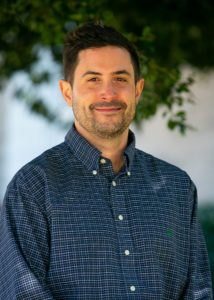Working Towards Creating Environmentally Safe Food – An Interview with Jared Cates
Jared Cates, MSW, is a Community Mobilizer at Carolina Farm Stewardship Association(CFSA). Jared is a 2012 UNC School of Social Work graduate, with a specialization in community management and policy practice. Jaredspoke with Dr. Marie Weil, Professor Emeritus, this past summer to share his journey and experience as a macro social worker. Highlights from that conversation are shared below.
Journey to Macro Practice
Growing up, Jared shared that his family was “into food.” His father was a chef and worked at one of the first vegetarian restaurants in the Triangle area. Jared grew up around gardens and cooking. Before his path led to UNC, Jared worked at for Volunteers for Youth, running their Juvenile Community Service and Restitution Program for three years. There, he managed community worksites for youth going through the juvenile court and community service program. Many of the worksites were community gardens throughout Orange County. Jared worked alongside the youth there and came to realize that they did not really understand what fresh food was or where it came from. This experience led him to ask questions about the food system, consider how food and poverty are interconnected, and explore the role policy and systems play.
Carolina Farm Stewardship Association
Founded in 1978 by farmers in Chatham County, CFSA is one of the longest standing agricultural organizations in the southeast. At that time, pesticides and chemicals were used regularly and the local farmers did not want to participate in those practices. CFSA was founded to educate farmers, connect, and create a community of care for organic farmers. The Association serves all of North and South Carolina and currently has three teams – farm services, education, and policy. The policy team of five employees works towards understanding how state and federal level policies affects systems and how they can support members in creating policies that can better serve communities. Farm stewardship, according to Jared, means “supporting agricultural systems and farmers who are growing food that is healthy for people and the planet.” CSFA works towards creating a food system that is fair, environmentally friendly, balanced, safer and equitable for the world.
Internship at CFSA
Jared first learned about CFSA by going to a macro placement lunch. At the lunch, he was looking to find an internship that was food focused. While there, he heard Fred Broadwell, the supervisor at CFSA at the time, speak about CFSA. He met with Fred Broadwell after the lunch and stated “our forces aligned” which led to the internship and later, his job.
During the internship, Jared had a few different roles, which included helping organize a conference that hosts around 1,000 people every year. He also worked on a survey of policies and county level food system investments across South Carolina that assessed what South Carolina had done to advance sustainable farming and food systems in general.
As the internship was winding down, a grant opened up to do a Farm Bill Barn Storm Tour across North and South Carolina to educate people about the the farm bill and organizing events to support action. While his internship responsibilities were very task oriented and designated by his supervisor, when he began working full time, he became the driver for the direction his work took. His year of experience built a foundation of trust needed to build his supervisor’s confidence in his ability to do this work and led to a 30 hr/week position based on farm bill advocacy After being employed part time for about a year, his work expanded as the organization identified new grant opportunities around food systems assessments, and agricultural policy and advocacy.
Current Work
 Currently, Jared wears two hats as a Community Mobilizer. Ninety percent of his time is spent on a team called Community Food Strategies. It is an inter-agency team uniquely supporting the development of food policy councils around North Carolina. CFSA is just one of six partner organizations bringing cross-sector voices together to create a deeper dialogue around food and to support the network of food councils across the state. On that team, Jared does direct facilitation and resource development that aims to support the network of 36 councils in North Carolina. The team works on networking to connect food policy councils across the state so they are learning best practices and from each other. Jared also specifically works on the policy side, helping food councils understand how they can engage in policy on a local level and collaboratively at the state and federal level. Another 10% of Jared’s time is dedicated to CSFA’s Policy Team, which focuses on advocating on behalf of CFSA farmer members.
Currently, Jared wears two hats as a Community Mobilizer. Ninety percent of his time is spent on a team called Community Food Strategies. It is an inter-agency team uniquely supporting the development of food policy councils around North Carolina. CFSA is just one of six partner organizations bringing cross-sector voices together to create a deeper dialogue around food and to support the network of food councils across the state. On that team, Jared does direct facilitation and resource development that aims to support the network of 36 councils in North Carolina. The team works on networking to connect food policy councils across the state so they are learning best practices and from each other. Jared also specifically works on the policy side, helping food councils understand how they can engage in policy on a local level and collaboratively at the state and federal level. Another 10% of Jared’s time is dedicated to CSFA’s Policy Team, which focuses on advocating on behalf of CFSA farmer members.
Through both his work on the CFSA and on the Community Food Strategies team, Jared engages in direct community organizing. He works directly with food policy councils to support them in strategically planning for their work and enhancing their community’s participation in creating food systems change. Advocacy requires a thoughtful plan and an understanding of decision-making, rules and entities, and CFSA’s Policy Team does direct organizing and lobbying on behalf of their farmer members
Jared also engages in writing and resource development, including blogging about food systems for the larger public and developing toolkits to support food policy councils and food advocates in their work Written communication skills are also important for developing guides and resources for food councils. Jared led the development of an online Strategic Advocacy Toolkit t that features modules on how to build relationships with food system decision makers and lawmakers. Although consistent and reliable, Internet is still not readily available to everyone in rural areas, they hope it can be a helpful resource to some. In this work, Jared shared that some of the best skills he has been able to develop includes group facilitation and public speaking. He shared that these skills have helped him in all aspects of his work. Other skills he has developed on the job includes consent-based decision making, graphic design, lectures and presentations, event planning, policy analysis and network development.
Experience at the School of Social Work
When thinking about his experience at SSW, Jared shared that his internship at CSFA was invaluable, above and beyond anything else. Additionally, Jared’s policy classes opened his eyes to how policy affects people and helped him move beyond his general knowledge of policy.
Jared educated other students about CSFA and the topic of food policy. Many people didn’t understand how working with farmers equated to macro social work. Jared loved having an opportunity to share with classmates about his work because he too was figuring out how it related to social work, and as he learned, both he and his classmates were able to see how important creating an equitable food system is to the social work field.
Long Term Goals
Dr. Weil asked Jared about his long-term goals related to his work at CFSA. His ultimate goal in his work with Community Food Strategies is to support the network of food councils in North Carolinato be self-sustaining and the project to have a life of its own – beyond their new 4-year grant. Ideally, Jared and his colleagues “hope to work our way out of a job” by support the network of food policy councils to be self-sustaining and to be successful in their work, both locally and in collaboration with other food system stakeholders around the state.
On the CFSA Policy Team, Jared has worked hard to make personal connections with lawmakers and staff at the state and federal level. Jared feels that their membership is an important presence – farmers care deeply about food policy and with a vision toward the “long game” will always be at the offices of lawmakers, bringing forward their perspectives. This work will be ongoing and success will eb and flow with state and national political trends, but Jared is excited to support farmers, farm workers, and food advocates in engaging in collaboratively creating a more equitable food system through policy change.
